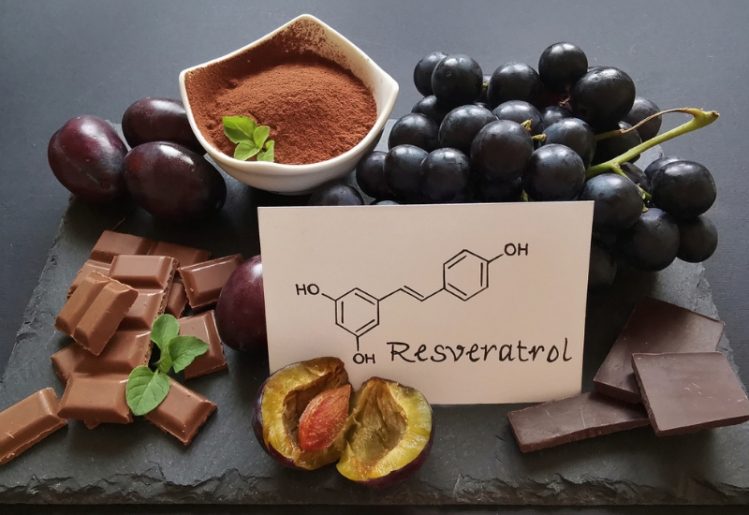While there are many proven health benefits of red wine, the majority can be attributed to one specific compound found in the grapes used to make the wine. This plant constituent is called resveratrol, and it’s the compound that helps give color to the skin of red grapes. It also helps protect grapes from fungal infections, droughts, extreme sun exposure and other environmental threats. While the resveratrol in red grapes helps the plant thrive in adverse environmental conditions, the protections it provides are not restricted to plant life.
Resveratrol: A Potent Antioxidant
 Aside from the protective role it plays in grape plants, resveratrol contains antioxidants that are also extremely beneficial to human health. The high content of resveratrol in red wine delivers powerful antioxidants into the blood supply, which help to protect against free radicals in the body.
Aside from the protective role it plays in grape plants, resveratrol contains antioxidants that are also extremely beneficial to human health. The high content of resveratrol in red wine delivers powerful antioxidants into the blood supply, which help to protect against free radicals in the body.
Free radicals are molecules that oxidize the cells throughout the body, making them more susceptible to damage and infection. The number of free radicals rises during times of stress and when an individual suffers from chronic inflammation, causing an increase in the risks of developing obesity, metabolic syndrome, cancer and other disorders. However, the antioxidants that resveratrol provides help to destabilize free radicals and eliminate their ability to negatively affect other molecules throughout the body.
Antioxidants protect us from free radicals in other ways as well. By allowing free radicals to oxidize the antioxidants themselves, the free radicals are discouraged from going after the healthy cells in the body. This reduces the overall number of free radicals circulating in the body, helping to decrease the risk of certain illnesses.
Resveratrol is one of the best compounds from which to derive antioxidant support because the body is able to absorb it with little difficulty. This plant constituent is also very active, which means its antioxidant power is readily available for use. So, in addition to being beneficial once introduced into the body, resveratrol makes it easier for the body to absorb antioxidants. This process allows resveratrol to promote several specific health benefits, such as those listed below.
What Are the Health Benefits of Red Wine?
Heart Health
There have been several studies over the years that have established a link between drinking red wine in moderation and exhibiting better heart health. In particular, a study conducted last year found that drinking red wine could reduce the risks of developing coronary heart disease, which is a condition that’s responsible for the most U.S. deaths. To achieve these benefits without experiencing the negative effects that alcohol can bring, men should limit themselves to two glasses of red wine per day, while women should only drink one glass daily.
Gut Health
The gut microbiome is a community of trillions of microorganisms that help the body function. This community relies on the introduction of a diverse selection of bacteria, derived from natural sources. The resveratrol and other compounds found in red wine act as prebiotics, which the gut uses to promote a more varied array of helpful bacteria. While research concerning the effects of red wine on the gut microbiome continue, current findings suggest the prebiotics red wine provides are helpful in maintaining a healthy gut.
Type 2 Diabetes
While drinking other types of alcoholic beverages may actually pose a greater risk to those suffering from type 2 diabetes, drinking red wine may be helpful. In a 2015 study, subjects who drank red wine exhibited lower blood sugar levels, which researchers attributed to the ethanol in the wine. They believe the ethanol and the natural compounds in the red grapes used to make the wine worked together to improve the metabolism of the subjects.
Hypertension
One of the more commonly known benefits of red wine is that drinking it in moderation can help to lower blood pressure. It does this by increasing the level of HDL, or good cholesterol, in the blood supply. Resveratrol contains compounds called procyanidins, which act to improve the health of blood vessels throughout the body. In addition to raising HDL levels, this helps ensure healthy blood flow throughout the blood vessels.
Post-Stroke Brain Damage
Drinking red wine after suffering a stroke can help protect against secondary brain damage. This is largely due to the fact that that the antioxidants in resveratrol help to modulate inflammation and oxidative stress, which would otherwise promote more cell death in the brain.
Vision Loss
 As we get older, we become more susceptible to conditions that can affect our ability to see well. Partial or complete vision loss can result from glaucoma, diabetic retinopathy, cataracts or macular degeneration. Since the antioxidants in red wine help to protect against oxidative stress, the inflammation that increases the risks of developing these conditions is also reduced. While it’s necessary to take other steps to protect your vision, moderate red wine consumption can also help.
As we get older, we become more susceptible to conditions that can affect our ability to see well. Partial or complete vision loss can result from glaucoma, diabetic retinopathy, cataracts or macular degeneration. Since the antioxidants in red wine help to protect against oxidative stress, the inflammation that increases the risks of developing these conditions is also reduced. While it’s necessary to take other steps to protect your vision, moderate red wine consumption can also help.
Cancer
While excessive alcohol consumption can cause a broad range of health problems, including raising the risks of certain types of cancer, the moderate consumption of red wine can be beneficial. Observational studies have found that women who moderately consume red wine on a regular basis are less likely to develop breast cancer. Researchers believe this is because the wine reduces estrogen levels, while increasing testosterone in older women. While research is ongoing, the occasional glass of red wine may help protect against more types of cancer.


